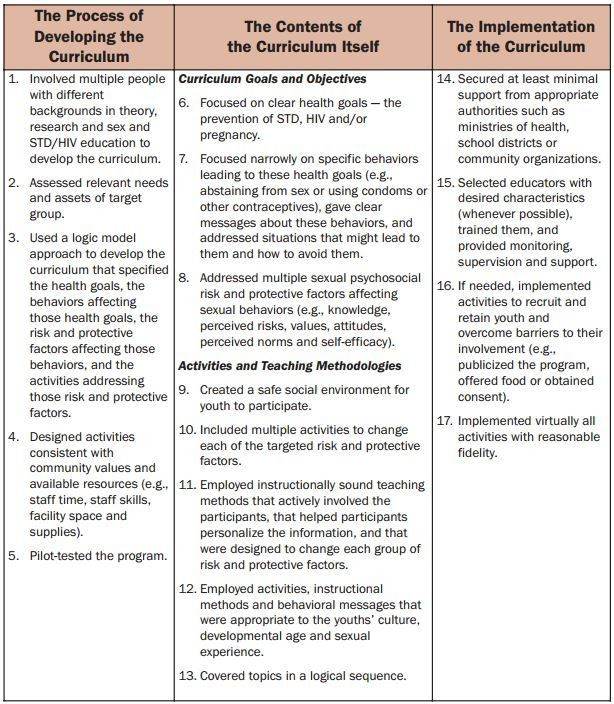Women's Health Suffers When You Defund Family Planning Programs, Push Abstinence-Only Sex Education

More than 40 years ago the Title X Family Planning Program was enacted to give millions of low-income or uninsured individuals access to family planning and related preventive health services, like birth control, pregnancy and STI tests, as well as breast and cervical screenings. The U.S. Department of Health & Human Services (which oversees the program) reports that in 2011, Title X-funded centers saw approximately five million clients — 92 percent were women, 8 percent were men — in addition to helping avert one million unintended pregnancies, testing hundreds of millions of Americans for STIs and HIV, and providing 1.5 million cervical cancer screenings. In 2010, The Guttmacher Institute found these STI and cancer screening tests helped avert 99,000 chlamydia infections, 16,000 gonorrhea infections, 3,700 cases of cervical cancer, and 2,100 cervical cancer deaths.
But this past week, The House Appropriation Subcommittee on Labor, Health and Human Services, Education, and Related Agencies proposed a budget for the 2016 fiscal year that would render devastating cuts to this program, along with other health care services currently reaching 4.6 million people. What’s more are the proposed cuts eliminates nearly all federal funding for teen pregnancy prevention and sex education programs. Dr. Leslie Kantor, the vice president of education for Planned Parenthood Federation of America, told Medical Daily these latter cuts are especially unfortunate.
Kantor said funding for the teen pregnancy initiative would go from $105 million to $10 million — “only about as much money to keep the office open and keep the staff in place.” Kantor added this $10 million moves to something called “sexual risk avoidance,” which is just another way to say abstinence-only sex ed.
Abstinence-only programs have more or less taken precedence over comprehensive sex ed programs in the U.S. since the federal government enacted the Adolescent Family Life Act in 1982. So something like the teen pregnancy initiative was “a very important step forward for pregnancy prevention and sex ed in the country.” It was the first time federal resources had been devoted to sex ed other than abstinence-only programs; it provided “funding for organizations to replicate programs that have been found to work, programs that have been proven in rigorous studies that delay sex until older or use contraception when they do,” Kantor said.
“This is something you would think all Americans and policy makers would agree on,” she added. “They actually work and actually help kids in healthy ways.”
Abstinence-only vs comprehensive sex ed
Advocates for Youth, a non-profit organization and advocacy group based in Washington D.C., says that abstinence-only programs are eligible for federal funding if they meet an eight-point definition. These points make clear the purpose of the program must be to exclusively teach “the social, psychological, and health gains to be realized by abstaining from sexual activity.” Abstinence must also be taught as “the standard for all school-age children,” as well as “the only certain way to avoid out-of-wedlock pregnancy, sexually transmitted diseases, and other associated health problems.” What’s more is sexual activity outside the context of marriage is made to sound psychologically and physically harmful.
None of these characteristics are among the ones the Centers for Disease Control and Prevention (CDC) identified among effective sex ed programs. Instead, these programs focus on “clear health goals, like the prevention of STD, HIV, and/or pregnancy; focus on specific behaviors leading to these goals, like abstaining from sex or using condoms or other contraceptives; and address multiple sexual psychosocial risk and protective factors affecting sexual behaviors, such as knowledge, perceived risks, values, and attitudes.”
To find these characteristics, CDC scientists conducted systematic reviews of 83 studies of HIV prevention and sex ed programs from both developed and developing countries. The total list of characteristics (shown below) also considers the process of developing the curriculum, the contents of the curriculum, as well as how the curriculum was implemented.

Abstinence-only programs, as Planned Parenthood points out, provide misinformation and purposefully withhold medically-accurate information necessary for young men and women to make healthy, informed choices when it comes to sex. The proposed budget aside, this is something more people are realizing.
Back in May, Donald Black, the superior court judge of Fresno County in California, ruled "health classes exclusively teaching students to remain abstinent until marriage didn't meet the state’s comprehensive sex ed requirements," ThinkProgress reported. Black concluded the country’s high-rate of STIs and unintended pregnancy warranted accurate information, “an important public right." Case and point: the chlamydia outbreak at a Texas high school where no sex ed classes are offered.
More recently, at keast one study found students themselves think sex ed could be more in-depth and inclusive (at least in the U.K.), while another found teaching women about highly-effective forms of birth control significantly reduced their rate of unintended pregnancy.
Kantor said, too, when polling voters, parents, and teens about sex ed, people overwhelming support comprehensive programs; about 95 percent of parents and teens support this kind of education being taught in high school. Respondents claim they want to know more about birth control and sexual orientation, with over 90 percent of respondents expressing an interest in learning more about healthy relationships.
“The country is not divided by people who want [a] comprehensive approach…everyone wants this,” Kantor said.
Sex misinformation in the media
The critically-acclaimed documentary Hot Girls Wanted shines a (harsh) light on the amateur porn industry. A quick Google search gives you several headlines like, “The Documentary That Will Make You Think Differently About Amateur Porn,” and “Netflix Hot Girls Wanted Documentary Exposes The Shocking Exploitation Faced By Amateur Porn Stars.” One of the most disturbing things we see in the film is the clearl lack of effective sex ed among some of the girls.
One up-and-coming star named Brooklyn Daniels said, “Plan B always works, I guess,” when talking about the withdrawal method her male co-stars relied on. Lucy Tyler, who has since left the industry, said, “This can’t be good for you to have sex that much, with that many different people…so weird that that’s my job.”
Plan B is commonly referred to as the morning after pill, and while it is effective — about 7 out of every 8 women who would have gotten pregnant don’t after taking the pill as directed — it’s not for everyone. Birth control methods in general are not one-size-fits-all and warrant comprehensive education in order to help women figure out what methods will be effective for them, personally.

If sex misinformation doesn’t confuse young women, it shames them. Take a look at The Duggar family, TLC’s former reality stars (the network cancelled their show amid Josh Duggar's sexual abuse case) and purveyors of abstinence-only education. Cosmopolitan’s Jill Filipovic reports that Jim Duggar explains to his daughters that having sex before marriage equates them to a used bike; “someone comes and rides first, leaving it all banged up.” Or worse, girls are basically a bucket of spit. Filipovic says Michelle Duggar offers this explanation:
“What if we were at a meeting with about 100 other people and the speaker asked that a large cup be passed around and that everyone spit in the cup? What if you happened to be all the way in the back — the last person on the last row — and when the cup finally came to you, the speaker asked you to drink out of the cup? What would you do?'"
These scenarios don’t exist only in religious households either. Sex ed classes in Mississippi, for example, were recently found to compare women to dirty pieces of chocolate. Both the Duggars' and Mississippi's approach are rooted in the antiquated idea a woman’s identity and self-worth is determined by sexual purity, that sex before marriage automatically makes women dirty and worthless (hello, slut-shaming). Worse yet, as we learned in Elizabeth Smart's case, abstinence-only education devalues rape victims.
"The best thing we can do is educate young people as young as we can reach them," Smart said.
What we gain with quality sex ed
Sex ed over the years has improved, but the truth is, it is still the case that very few people truly get comprehensive sex ed. Instead, Kantor said some people receieve ] evidence-based programs through school or their community, while other young people are getting unproven, abstinence classes.
"[These classes are] really more ideologically based, and you still see quite a bit of homophobia and lots of gender stereotyping: Girls should be or are this way, or girls never want sex, and boys always want to have sex," Kantor said. "There tends to be very little or no information on birth control and to that extent, it exaggerates the failure rates, so we’ll hear from young people something like, ‘[Sex ed] left me with the idea I shouldn’t bother to use the condom because they’re holes in them.’”
This is assuming young people are in classes touching on these topics at all. The CDC’s 2012 school health profiles offers a state-by-state analysis of the topics covered by sex ed and HIV prevention programs, and the states with higher rates of unintended pregnancies and STIs were covering a limited amount of topics compared to states with lower rates.
“You can’t say this is causal,” Kantor said, “but you can say ‘look, there’s an association between states not teaching them very much about sex.’”
According to Kantor, Title X is one of the most successful programs in government history. It’s extremely cost-effective, too: every dollar funded into family planning is estimated to save consumers about seven dollars. True, few are convinced Title X will completely go away, or that the senate will propose similar cuts, but it is worrisome congressman would consider severely cutting spending for women’s health.
“We live in a country where 99 percent of women use birth control in their life. There is a huge disconnect.” Kantor said. “Can I tell you person-by person what this posturing is about, no — but I think what we do know is there’s unfortunately a perception of some Republicans that [these cuts are] a way to appeal to their more conservative supports…there’s a really clear political agenda.”
It's not just the lack of affordable access to birth control and tests women will suffer from, but the lack of knowledge in general. Safe, social spaces help women learn and ask questions they may feel scared to otherwise.
“When implemented by trained teachers, based on not just telling kids information, but letting them build the skills, [comprehensive sex ed] can really make a difference," Kantor said. "It really is a shame we would have any policymakers [against it]. We ought to be putting more money into these programs.”
Published by Medicaldaily.com



























